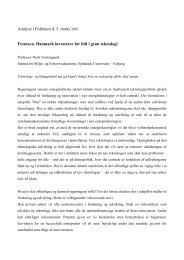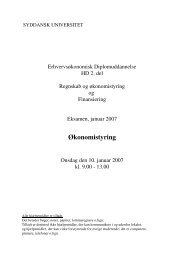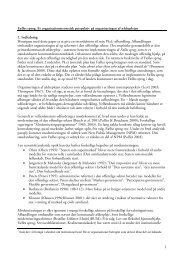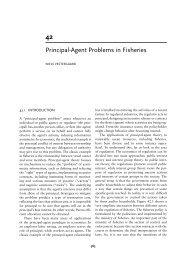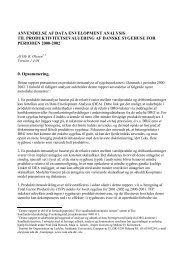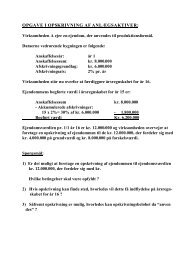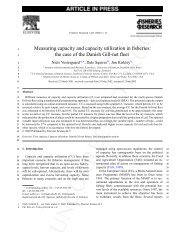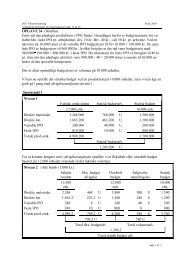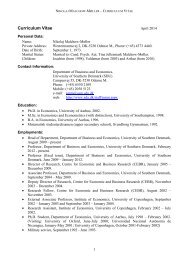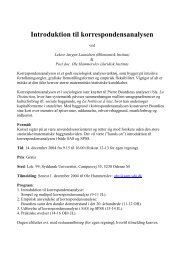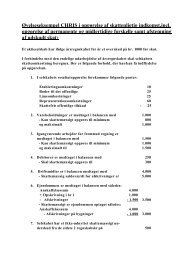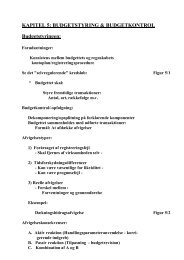Polish middle class. Thus, <strong>in</strong> January 2001 the platform (PO) ga<strong>in</strong>ed between 17 <strong>and</strong> 20 pct. <strong>of</strong> thevotes; the question, however, was, whether the high electoral support might be susta<strong>in</strong>ed also at theforthcom<strong>in</strong>g elections. Some other parties <strong>and</strong> factions jo<strong>in</strong>ed the PO. After some time <strong>of</strong> hesitationthe liberal AWS faction SKL took the decision to jo<strong>in</strong> the Civic Platform (PO). At the 2001 nationalelection PO ga<strong>in</strong>ed 12 pct. <strong>of</strong> the votes. Nonetheless, the left w<strong>in</strong>g SLD-UP was able to establish anew majority government together med the PSL. Thus, the votes <strong>of</strong> PO did not become decisive atthe formation <strong>of</strong> the new government. As noted above, the Freedom Union (UW) lost representation<strong>in</strong> parliament. The new middle class <strong>and</strong> entrepreneurs tended to prefer the platform (PO) due t<strong>of</strong>ear <strong>of</strong> waste <strong>of</strong> votes. A great part <strong>of</strong> the <strong>in</strong>telligentsia liked PO’s “economic language”, subjectslike macoeconomic stabilization, lower taxes <strong>and</strong> a new labour market policy <strong>and</strong> labour codex 75 .The Civic Platform (PO) aimed to be transformed <strong>in</strong>to a political party <strong>in</strong> the proper sense <strong>of</strong> theword, yet with a more “light” almost American cadre type <strong>in</strong>stitutional structure. The applicationabout be<strong>in</strong>g registrated as a political party was h<strong>and</strong>ed over <strong>in</strong> November 2001 <strong>and</strong> accepted by theauthorities <strong>in</strong> March under the slightly revised name The Republic <strong>of</strong> Pol<strong>and</strong>s Civic Platform 76 . Theparty convent became the center <strong>of</strong> decision mak<strong>in</strong>g. PO’s organizational kernel, however, was theparliamentary group. The aim was to avoid as much party bureaucratization as possible. Somegroups, e.g. the conservative faction SKL, rejected that type <strong>of</strong> party <strong>in</strong>stitutionalization 77 . Onregional level, that person, who obta<strong>in</strong>ed the greatest number <strong>of</strong> votes, should be the regionalleader.Soon after the 2001 election some <strong>of</strong> the new parliamentarians, such as the former m<strong>in</strong>ister ArturBalacz, left the platform refus<strong>in</strong>g to subscribe the declaration about jo<strong>in</strong><strong>in</strong>g the new party CivicPlatform (PO). Later, one <strong>of</strong> the “tenors”, Andrzej Olechowski, resigned from the leadership,however, without much political “noice” <strong>and</strong> without leav<strong>in</strong>g the party. Artur Balazs set up a newpolitical formation (“SKL-Ruch Polski”), which <strong>in</strong>cluded some centre-right group<strong>in</strong>gs, mostly fromthe former SKL <strong>and</strong> the Christian-Democratic PPChD, <strong>in</strong> other words, one more attempt to “unitethe Right”. It seemed that Olechowski aimed once more to be presidential c<strong>and</strong>idate <strong>in</strong> 2005, <strong>in</strong>which case Kwasniewski accord<strong>in</strong>g to the constitution had to leave the post. That plan, however,was thwarted because <strong>of</strong> the defeat at the local election.<strong>in</strong> Warsaw. Instead, at the 2003 conventionthe party chairman Donald Tusk was put forward as the c<strong>and</strong>idate for president. Thus much<strong>in</strong>dicated that the new party might tend to be divided <strong>in</strong> different veto-type factions just like thefomer AWS. At the party convent <strong>in</strong> June 2003 Plazynski <strong>in</strong>formed about his decision to resignfrom the platform argu<strong>in</strong>g that the new party had become too elite-driven <strong>and</strong> therefore not aspokesman for the ord<strong>in</strong>ary citizen. Moreover, Plazynski argued that the leadership <strong>of</strong> the party hadnot been able to promote establishment <strong>of</strong> a broadly based centre-right alternative to the SLD-UPgovernment.At the party convention <strong>in</strong> June 2003 Donald Tusk became the new chairman <strong>of</strong> the party <strong>and</strong> thelikely future c<strong>and</strong>idate for president. And Andrzej Olechowski became the chairman <strong>of</strong> theprogramme comimission <strong>of</strong> the party. The party programme aimed to comb<strong>in</strong>e liberal pr<strong>in</strong>ciples <strong>and</strong>the m<strong>in</strong>imal state with religious values accord<strong>in</strong>g to the slogan about “freedom, tradition <strong>and</strong>christianity”. Maybe the party had an eye to the Hungarian FIDESZ, that <strong>in</strong> the mid 1990’ssuccessfully transformed itself from a dist<strong>in</strong>ct liberal to a s<strong>of</strong>t center-right traditionalist party. The75 See e.g. Mariusz Janicki, Wieslaw Wladyka, “Kto wpuscil Leppera?”, Polityka, no. 40 (2318), 6 October 2001:5.76 “Platforma Obywatelska Rzecczpospolita Polskei”.77 Mariusz Janicki, “Platforma Obywatelska: ledwie partia, juz rozlam, Dwoch bez atu”, Polityka no. 47 (2325) 24November 2001:30.84
critique <strong>of</strong> the SLD-UP government became sharper regardless the agreement with SLD about theEU policy. The aim was after next election to form a government with Jaroslaw Kaczynsky’s PiSdespite personal <strong>and</strong> policy disagreements, e.g. different attitudes to tax policies <strong>and</strong> the fortcom<strong>in</strong>gEU constitution treaty. However, mov<strong>in</strong>g closer to next ord<strong>in</strong>ary election <strong>in</strong> 2005 the policydifferences between PO <strong>and</strong> PiS became more strik<strong>in</strong>g. Maybe therefore, Civic Platform (PO)changed strategy toward constructive programmatic opposition (Fiala etc, 2003:15), <strong>in</strong> crucialpolicy questions even support<strong>in</strong>g Marek Belka’s transitory government <strong>in</strong> return for obta<strong>in</strong><strong>in</strong>gimportant appo<strong>in</strong>tments <strong>in</strong> the government. The EU policy gave rise to some debates <strong>in</strong> the CivicPlatform (PO). Jan Rokita preferred a tough l<strong>in</strong>e accord<strong>in</strong>g to the slogan about “Nice or die” <strong>and</strong>former form<strong>in</strong>ister Andrzej Olechowski preferred a compromise with France <strong>and</strong> Germany on theEU consitution treaty. At the 2004 EP elections PO ga<strong>in</strong>ed 24 pct. <strong>of</strong> the votes. Also FreedomUnion (UW) passed the treshold requirement, may be due to the c<strong>and</strong>idacy <strong>of</strong> still popular formerparty chairman Bronislaw Gemerek.After some setbacks <strong>in</strong> electoral support, <strong>in</strong> autumn 2003 the prospects <strong>of</strong> electoral success seemedbrighter, <strong>in</strong> the op<strong>in</strong>ion polls the Civic Platform (PO) passed the left w<strong>in</strong>g SLD by ga<strong>in</strong><strong>in</strong>g about 30pct. <strong>of</strong> the votes, mov<strong>in</strong>g close to a majority <strong>of</strong> seats <strong>in</strong> parliament. That positive trend wasconformed at the European Parliament election <strong>in</strong> June 2004, ga<strong>in</strong><strong>in</strong>g 24 pct. <strong>of</strong> the votes. Thus, thef<strong>in</strong>al outcome <strong>of</strong> the next national election seemed be a new PO led m<strong>in</strong>ority government, maybewith the tacit support (a “secret power shar<strong>in</strong>g agreement”) with at least one <strong>of</strong> the two socialdemocratic parties, i.e. SLD <strong>and</strong> SDPL. As noted above, an <strong>in</strong>dication <strong>of</strong> that trend was the partialsupport <strong>of</strong> PO to the government <strong>of</strong> Marek Belka. Thus, <strong>in</strong> summer 2004 PO supported proposalsfrom this “transition government” when vot<strong>in</strong>g on changes <strong>in</strong> the health sector <strong>and</strong> public transfer<strong>in</strong>come regulations, maybe <strong>in</strong> that way reprocitat<strong>in</strong>g the oppo<strong>in</strong>tment <strong>of</strong> people close to PO, e.g.m<strong>in</strong>ister <strong>of</strong> f<strong>in</strong>ance Miroslaw Gronicki <strong>and</strong> Andrzej Ananicz to leader <strong>of</strong> the <strong>in</strong>telligence service, toimportant posts <strong>in</strong> society. In other words, a a political “power triangle consist<strong>in</strong>g <strong>of</strong> ” “Wiejska(parliament)- Rozbrat (SLD) <strong>and</strong> the presidential <strong>in</strong>stitution (Alex<strong>and</strong>er Kwasniewski)” seemed toemerge.2.13. SLDAfter the demise <strong>of</strong> the old system <strong>and</strong> the defeat at the first semi-free election the Polish Left badlyneeded a new political vision, a new discource. SDL was founded <strong>in</strong> July 1990 as an electionalliance consist<strong>in</strong>g <strong>of</strong> more than 20 different left w<strong>in</strong>g groups. Wlodzimierz Cimoszewicz, the laterpremier <strong>and</strong> foreign m<strong>in</strong>ister, <strong>and</strong> Aleks<strong>and</strong>er Kwasniewski, the later president, were among the<strong>in</strong>itiators. Thus SdRP <strong>and</strong> later SLD were established after a split <strong>in</strong>side the old communist party(PZPR) that took place after the round table negotiations <strong>in</strong> 1988-1989. The decision about thefoundation <strong>of</strong> SLD shall be seen <strong>in</strong> the context <strong>of</strong> preparations to the first free election <strong>in</strong> 1991. Inspite <strong>of</strong> the election defeat many Poles had a share <strong>in</strong> the old system. Therefore the rejection <strong>of</strong> realsocialism was not unconditional. In other words, SLD was established <strong>in</strong> an “exogen” wayconnected to those social groups with a share <strong>in</strong> the old system. The formation <strong>of</strong> SLD took place <strong>in</strong>the “endogen” way as the foundation <strong>of</strong> SLD was caused by the split <strong>in</strong>side the then communistparty (PZPR).As noted <strong>in</strong> presious sections, the left w<strong>in</strong>g parties <strong>in</strong> the CEEC’s can be divided <strong>in</strong>to three parts,first authentic historical social democratic parties such as the Czech CSSD, second reformed postcommunist“successor” parties <strong>and</strong>, thirdly, non-reformed or partly reformed communist parties85
- Page 3:
“This provisional situation chara
- Page 6 and 7:
marketisation and privatisationshor
- Page 8 and 9:
purposes, are channels for “expre
- Page 10 and 11:
the significance of strategic choic
- Page 12 and 13:
presidentialism gave rise to “flo
- Page 14 and 15:
antipolitics and reinforcement of a
- Page 16 and 17:
In the late 1990’s elections most
- Page 18 and 19:
determined primarily by “politica
- Page 20 and 21:
politics and antipolitics, all sign
- Page 22 and 23:
which attitudes to state regulation
- Page 24 and 25:
Anti-communism has been defined in
- Page 26 and 27:
elections and the Slovak communists
- Page 28 and 29:
Cartel agreementsbetter representat
- Page 30 and 31:
Basically the absence of clear cons
- Page 32 and 33:
After 1989 different types of polit
- Page 34 and 35: complex project for transition unde
- Page 36 and 37: window of opportunity in spite of s
- Page 38 and 39: analyses of party institutionalizat
- Page 40 and 41: political messages and slogans. Thu
- Page 42 and 43: well established party culture may
- Page 44 and 45: expected, much due to the many spli
- Page 46 and 47: Furthermore, the polarisation on el
- Page 48 and 49: Finally, Solidarity can also be con
- Page 50 and 51: whole, on the one side an authorita
- Page 52 and 53: The economic recession and the grav
- Page 54 and 55: election defeat more cooperation an
- Page 56 and 57: The formation of AWS can be conside
- Page 58 and 59: group. RS AWS constituted the Chris
- Page 60 and 61: According to the original plans the
- Page 62 and 63: values. According to Rybicki, as so
- Page 64 and 65: AWS should fight against all types
- Page 66 and 67: 2001 parliamentary election, howeve
- Page 68 and 69: and workers voted ZChN. At the 1993
- Page 70 and 71: The League has been considered as a
- Page 72 and 73: establishment like than LPR’s. Th
- Page 74 and 75: jobs in rural areas, especially sma
- Page 76 and 77: industrial policy. According to the
- Page 78 and 79: pressurizing the government to give
- Page 80 and 81: democrats, thereby locating itself
- Page 82 and 83: To conclude, the Freedom Union (UW)
- Page 86 and 87: such as KSCM and KSS in The Czech R
- Page 88 and 89: The SLD leaders were mainly recruit
- Page 90 and 91: the falling popular support for pri
- Page 92 and 93: innovation was formation of the pol
- Page 94 and 95: place after talks with each applica
- Page 96 and 97: Has the Left any freedom of manoeuv
- Page 98 and 99: medicine, changes in the labour cod
- Page 100 and 101: The Labour Union (UP), Democratic U
- Page 102: Nevertheless, before that had taken



